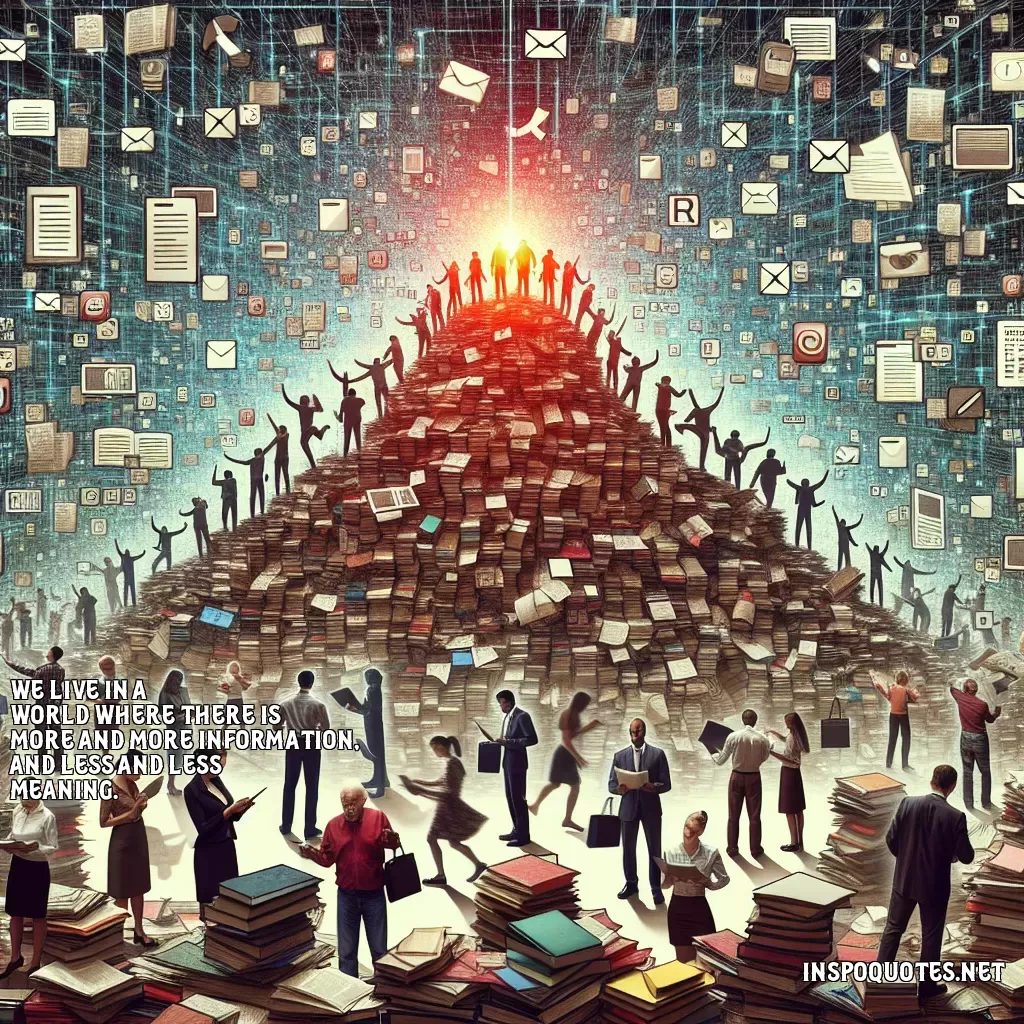
We live in a world where there is more and more information, and less and less meaning.
Author: Hans Rosling
👁️ 16 views

We live in a world where there is more and more information, and less and less meaning.
👁️ 16 views
This quote highlights a fundamental paradox of the modern information age: we are inundated with data and information from countless sources, yet this abundance often fails to translate into increased understanding or meaning in our lives. In today's digital era, we have unprecedented access to vast amounts of information. The internet, social media platforms, and a 24-hour news cycle contribute to a constant flow of data. While this access can be empowering, it can also be overwhelming. Amidst this information overload, it becomes challenging to discern what is valuable or true. Not all information carries the same weight or relevance, and the sheer volume can make it difficult to separate meaningful insights from noise. Often, instead of aiding our understanding, the excess of information can lead to confusion, misinformation, or apathy. The challenge is not just the availability of information, but how it is curated, interpreted, and integrated into our context to create meaningful knowledge. Furthermore, the rapid pace at which information is generated and consumed can lead to a superficial engagement with content, where headlines and soundbites are prioritized over deeper analysis and understanding. The quote suggests a need for a shift in focus—from amassing data to cultivating wisdom and meaning. By developing critical thinking skills and seeking diverse perspectives, individuals can navigate this landscape more effectively, transforming the vast sea of information into a source of meaningful knowledge and insight.
Quote By: Hans Rosling
Hans Rosling was a distinguished Swedish physician, academic, and public speaker, renowned for his innovative approach to global health and development. Born on July 27, 1948, in Uppsala, Sweden, Rosling embarked on a journey that would not only shape his career but also change the way we perceive global data. He earned his medical degree from the Karolinska Institute and later received a doctorate in international health from the same institution. This academic foundation laid the groundwork for his future endeavors, as Hans Rosling sought to bridge the gap between complex statistics and accessible knowledge for the general public.
Throughout his career, Hans Rosling dedicated himself to studying global health issues, particularly in developing countries. His work often highlighted the stark realities of poverty, infant mortality, and disease, which many oversimplified or misunderstood. In doing so, Rosling founded the Gapminder Foundation in 2005, aiming to combat the misconceptions about global development through the use of statistical data and visualization. His tireless efforts to promote a data-driven understanding of the world earned him widespread recognition, and he became a sought-after speaker inspired by his engaging presentation style.
Rosling is perhaps best known for his TED Talks, where he captivated audiences with his dynamic presentations that utilized his expertise in data visualization. One of his most famous tools was the Trendalyzer software, which transformed static statistics into animated visuals, making complex data accessible and comprehensible. This method allowed Hans Rosling to communicate significant insights about global trends, debunking myths about poverty and development with clarity and enthusiasm.
Beyond his work in academia and public speaking, Rosling authored several influential books, including "Factfulness: Ten Reasons We're Wrong About the World—and Why Things Are Better Than You Think." In this work, he emphasizes the importance of critical thinking and a fact-based worldview. Hans Rosling passed away on February 7, 2017, leaving behind a legacy of insight and inspiration that continues to influence how the world perceives data and global development. Through his life's work, Hans Rosling fundamentally reshaped our understanding of global progress, urging us all to look beyond preconceived notions and appreciate the complexities of our world.